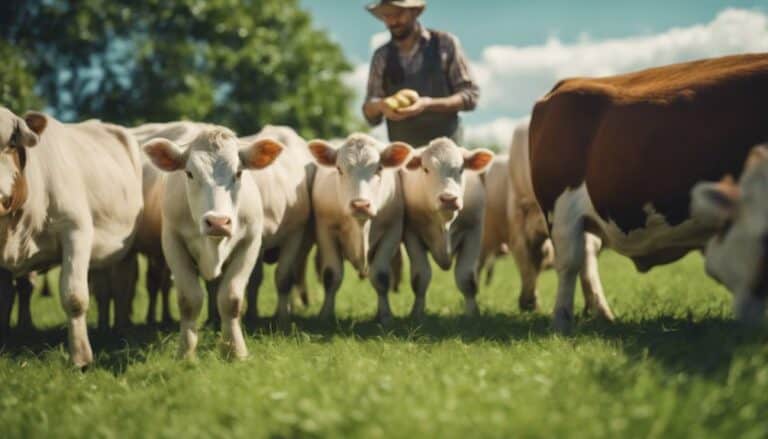When raising your organically raised livestock, focus on balanced diets with organic feeds. Provide nutrient-dense grains and forages, including alternative protein sources for growth. Opt for natural and sustainable nutrient sources while ensuring feed quality meets strict organic standards. Essential nutrients like protein for muscles, carbohydrates for energy, and vitamins for immunity are important. A well-rounded diet with minerals for bone health is key. Meticulously meet USDA organic standards with grains, legumes, fruits, and vegetables. Manage pastures for diverse, nutrient-rich grazing to enhance health and reduce stress. Consider organic supplements for overall health and productivity. Good nutrition is essential for thriving livestock.
Key Takeaways
- Prioritize balanced diets with organic feed sources for optimal nutrition.
- Include alternative protein sources like legumes for peak growth.
- Ensure vitamin-rich fruits and mineral-rich grains in feed rations.
- Mandate pasture grazing for health benefits and natural behaviors.
- Verify organic supplements meet USDA standards for livestock health.
Organic Livestock Nutrition Basics
When implementing organic livestock nutrition practices, it's essential to prioritize balanced diets rich in organic feed to guarantee the health and well-being of the animals. Organic livestock nutrition revolves around providing animals with nutrient-dense organic grains, forages, and alternative protein sources. These elements are vital for maintaining peak growth and performance in organic animals. In adhering to organic certification standards, organic livestock producers must source nutrients from natural and sustainable sources, making sure that the feed quality meets strict regulations.
The use of organic feed in balanced diets not only supports the health of the animals but also plays a significant role in upholding the integrity of organic certification. Meeting consumer expectations for organic products hinges on proper organic livestock nutrition practices. Supplementation practices must align with organic guidelines to guarantee that the animals receive all necessary nutrients without compromising the organic standards. By focusing on sustainable sources and nutrient-dense feed, organic livestock nutrition creates a foundation for healthy and thriving animals within the organic farming system.
Essential Nutrients for Organic Livestock
To ensure the prime health and growth of organic livestock, a balanced diet rich in essential nutrients such as protein, carbohydrates, fats, vitamins, and minerals is essential. Protein plays an important role in muscle development and repair in organic livestock. Common protein sources like soybean meal, alfalfa, and peas are often included in their feed.
Carbohydrates sourced from corn, oats, and barley provide the necessary energy for daily activities and growth in organic livestock. Additionally, vitamins such as A, D, E, along with minerals like calcium and phosphorus, are crucial for supporting immune function, bone health, and overall vitality in organic livestock.
Ensuring a well-rounded diet that includes these essential nutrients is key to maintaining the well-being and productivity of organically raised animals. By meeting their specific dietary needs, organic livestock can thrive and reach their full potential.
Balancing Organic Feed Rations
Balancing organic feed rations for livestock requires meticulous attention to meeting specific nutrient requirements outlined by USDA organic standards. When formulating these rations, organic farmers carefully select a variety of ingredients such as grains, legumes, and forage to guarantee a well-rounded diet for their animals. The table below illustrates the key components needed to achieve a balanced organic feed ration that supports the health and productivity of organically raised livestock:
| Nutrient Component | Sources | Role |
|---|---|---|
| Vitamins | Fresh fruits, vegetables | Essential for metabolic functions |
| Minerals | Mineral-rich grains | Support bone health and enzyme function |
| Protein Sources | Legumes, soybeans | Building blocks for muscle growth |
Pasture Management for Livestock Health
Properly managed pastures play an essential role in maintaining the health and well-being of livestock in organic farming systems. Pasture management in organic livestock farming focuses on providing animals with access to diverse, nutrient-rich grasses and forages. Grazing on pasture allows livestock to exhibit natural behaviors, promotes better health, and reduces stress. Organic standards mandate that cows must graze on pasture for at least one third of their lives to guarantee proper nutrition and well-being. This practice not only benefits animal health but also contributes to farm sustainability by improving soil health and reducing erosion.
Livestock raised on well-managed pasture have higher levels of omega-3 fatty acids and essential nutrients in their meat and dairy products. By ensuring that animals have access to high-quality forage, farmers can enhance the nutritional content of the products derived from these animals. Implementing effective pasture management strategies is essential for promoting animal health, meeting organic standards, and achieving overall farm sustainability.
Organic Supplements for Livestock
Organic livestock producers must verify that supplements for their animals comply with USDA organic standards to maintain organic certification. This means that supplements such as vitamins, minerals, and probiotics used in organic livestock farming must be sourced from organic ingredients. Organic livestock producers prioritize natural and sustainable supplement options to guarantee the health and well-being of their animals. Synthetic additives and non-organic supplements are strictly prohibited in organic livestock production to uphold the integrity of organic practices.
The use of organic supplements is essential in meeting the nutritional requirements of organically raised livestock. By providing these supplements in accordance with USDA organic standards, producers can promote the overall health and productivity of their animals while staying true to the principles of organic farming. Choosing organic supplements not only benefits the livestock but also contributes to a more sustainable and environmentally friendly approach to animal husbandry.
Conclusion
To sum up, feeding organically raised livestock requires careful consideration of essential nutrients, balanced feed rations, pasture management, and organic supplements.
By following these nutrition guidelines, you can guarantee the health and well-being of your livestock while also meeting organic standards.
Remember, you're what you eat, and the same goes for your animals – so give them the best to get the best in return!

